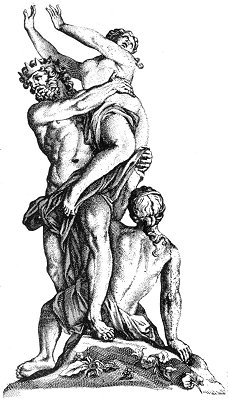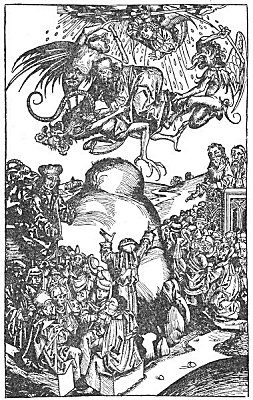p. 504
have conceived or abetted such plots. Be it so; I will not contradict him; I only wish to name these monsters.—Behold Weishaupt and his profound adepts! The reader will find the proofs of this exclamation in their own writings.
Weishaupt, who divided his mysteries into two classes, also distributed his last secrets under two heads. First, Religion; which was the object of the Mages: The other comprehended what he called his Polity; and he reserved it for the Man King. Let us separately investigate each of these degrees, commencing with that principle which he himself lays down, and from which he never deviates, that each degree shall be a preparatory concatenation of principles and doctrines, the ultimate tendency of which was to form the object of the last mysteries. Such a principle is more than sufficient to demonstrate that the secret to be imparted to his Mages can be no other than the most absolute Atheism, and the total subversion of every Religion. The adept, however, has already imbibed such horrid principles; and the secret consists in telling him, in plain terms, that it was toward that point the Sect had long since been leading him, and that in future all his thoughts, words, and actions, must tend to second the views of the Sect in their monstrous undertaking; that in the preceding degrees the name of Religion had only been preserved the better to destroy the thing; but that in future the very name would only be the expression of chimeras, of superstition, of fanaticism, supported by despotism and ambition, as a tool for enslaving mankind.
This explication is no vain fancy of mine. See Weishaupt confidentially writing to his intimate and incomparable Cato-Zwack:
“I firmly believe, that the secret doctrine of Christ had no other object in view than the re-establishment of Jewish Liberty, which is the explanation I give of it. I even believe, that Freemasonry is nothing but a Christianity of this sort; at least, my explanation of their Hieroglyphics perfectly coincides with such an explanation. In this sense, nobody could blush at being a Christian; for I preserve the name, and substitute reason,—denn ich lasse den namen, and substituiere ihm die vernunft.”—He continues: “It is no trivial matter to have discovered a new Religion and a new Polity in these tenebrous Hieroglyphics;” and he goes on to say, “One might be induced to think that this was my highest degree; I have, nevertheless, three of infinitely more importance, for our grand mysteries.” 4 Here then is Weishaupt’s decision on the degree of Epopt or Illuminized Priest.—It is Christianity preserving the name of Religion, with the Gospel converted into a Code by means of which Christ taught the Jacobinical Equality and Liberty. 5 Here Weishaupt is transcendent in his wickedness and his impiety; it is under the sacred name of Religion that he teaches his disorganizing principles of Equality and Liberty. After having led his Epopts to the pinnacle of Impiety, to what farther lengths can he possibly lead his Mage?—He may erase the names of Religion and God? And this he will do in his higher mysteries; for who can expect to find them when he says, “You know that the Unity of God was one of the secrets revealed in the mysteries of Eleusis; as for that, there is no fear of any such thing being found in mine.” 6
p. 505
After this, can the name of God be expected ever to be found in the mysteries of the Illuminized Mage for any other purpose than to be blasphemed? We see this same Weishaupt reserving all the Atheistical productions for this degree; he writes again to his incomparable man: “With our beginners let us act prudently with respect to books on Religion and Polity. In my plan, I reserve them for the grand mysteries. At first we must put only books of history or of metaphysics into their hands. Let Morality be our pursuit. Robinet, Mirabeau (that is to say, the System of Nature written by Diderot, though attributed to Mirabeau), the Social System, Natural Polity, the Philosophy of Nature, and such works, are reserved for my higher degrees.—At present they must not even be mentioned to our adepts, and particularly Helvetius on Man.” 7 The reader here sees a list of the most Anti-religious and the most Atheistical works, 8 and that they are reserved for these last mysteries. As a preparation for them (horribile dictu!) the very idea of a God must be eradicated from the mind of the adept. Can we doubt this, when we see Weishaupt thus write: “Do put Brother Numenius in correspondence with me; I must try to cure him of his Theosophical ideas, and properly prepare him for our views.—Ich will ihn suchen von der Theosophie zu curieren, and zu unseren absichten zu bestimmen.” 9 The Theosopher, or the man still believing in a God, is not fit for these mysteries; Religion then must, of course, be irreconcilable with them. Were the consequences less evident, and should we reject these secret correspondences, or condemn the last oracles of the Hierophant to remain within the hundred bolts which keeps them hidden from the adepts; I say, even then, to ascertain what the tenets of the Sect are as to any worship or religion, we should not be necessitated to enter that den of mysteries. Though Weishaupt had not mentioned Religion in his intimate correspondence, the Atheistical Conspiracy of his mysteries would be evident, and why seek private documents when he has given us irrefragable proofs of guilt in that which he publishes as his apology?

Moe is the founder of GnosticWarrior.com. He is a father, husband, author, martial arts black belt, and an expert in Gnosticism, the occult, and esotericism.



